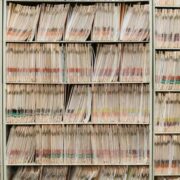Healthcare Records: How to Protect Patients’ Sensitive Information

The following guest post on protecting sensitive healthcare record data was submitted by Rachelle Wilber.
The Health Insurance Portability & Accountability Act (HIPAA) of 1996 requires that any entity that is privileged to collect or store sensitive patient healthcare information keep the information secured and protected against unauthorized access or use. A violation of the HIPPA law has serious implications to any healthcare practitioner or facility. By being vigilant and taking these action steps, you can help to protect the sensitive information of the patients who visit your healthcare facility.

The explosion of online sensitive healthcare data now available online must be secured to protect patient privacy and advance data integrity.
Cloud Encryption
Cloud-based data storage and applications service providers are allowing healthcare organizations to use their own encryption keys. These keys are unique to your facility and your own information technology officers can create them. By using these customized encryption keys for data that your healthcare facility uploads to the cloud, you can reduce the risk of unauthorized users gaining access to usable information. If a hacker did get into your database, they would be unlikely to be able to break the encryption key.
Coding Sensitive Data
In addition to encrypting data, you can also code it as it is entered. For example, if a patient has HIV, that condition could be given a numeric code rather than the name of the virus. Only authorized users at your facility would know what the code means.
Healthcare Administration
When you are ready to further your healthcare career and learn more techniques on coding and encryption of sensitive data, consider enrolling in one of many healthcare administration master’s programs that many universities offer. These accredited programs help you to master all aspects of administration that are essential to running a productive, efficient and compliant doctor’s office, clinic or hospital. You will learn about data administration as well as coordination of services, billing, communications and data analysis.
Physical Security
The physical security of patient information is also important. If your facility uses or still has any paper medical charts, they should be kept under lock and key and signed in and out when they are used. Laptops, tablets and other electronic devices should be password-protected. The computers and tablets should also be locked and put away when they are not in use.
By employing these measures in your healthcare facility, you can protect the sensitive patient data that you collect. Maintaining the security of the data helps to keep you compliant with the law. These measures also show to your patients that you care and respect their rights to privacy.
Rachelle Wilber is a freelance writer living in the San Diego, California area. She graduated from San Diego State University with her Bachelor’s Degree in Journalism and Media Studies. She tries to find an interest in all topics and themes, which prompts her writing. When she isn’t on her porch writing in the sun, you can find her shopping, at the beach, or at the gym. Follow her on Twitter and Facebook: @RachelleWilber; https://www.facebook.com/profile.php?id=100009221637700


